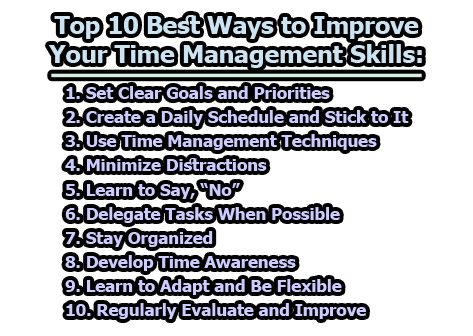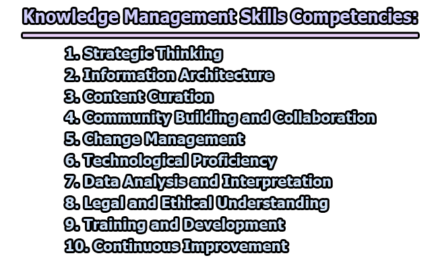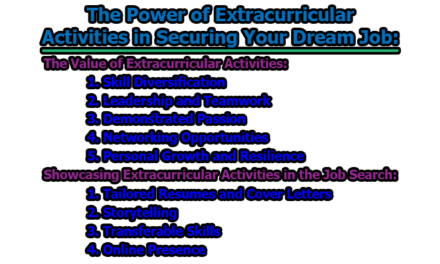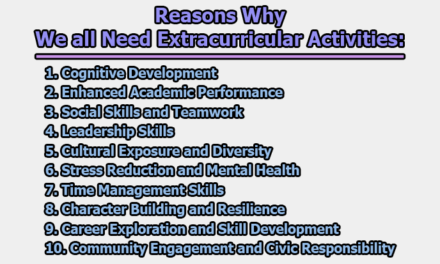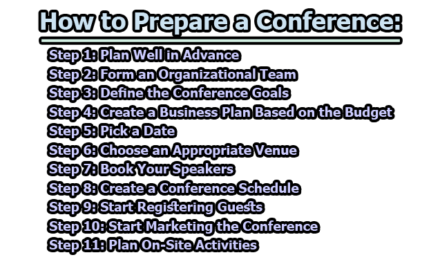Top 10 Best Ways to Improve Your Time Management Skills:
Time management is a crucial skill that impacts every aspect of our lives, both personal and professional. In today’s fast-paced world, being able to manage time effectively can make the difference between success and failure. Whether you are a student, a professional, an entrepreneur, or a homemaker, mastering time management can help you become more productive, reduce stress, and achieve your goals with greater efficiency. In the rest of this article, we are going to know about the top 10 best ways to improve your time management skills.
1. Set Clear Goals and Priorities: Setting clear and achievable goals is the foundation of effective time management. Take the time to define what you want to accomplish in the short term and long term. Having a clear vision of your objectives will guide your decision-making process and help you allocate time and effort more efficiently.
To further enhance your time management, prioritize your tasks based on their importance and urgency. Use techniques like the Eisenhower Matrix, where you categorize tasks into four quadrants:
- Urgent and Important: Tasks that require immediate attention and have a significant impact on your goals.
- Important but Not Urgent: Tasks that contribute to your long-term goals but don’t require immediate action.
- Urgent but Not Important: Tasks that demand immediate attention but don’t contribute significantly to your goals.
- Not Urgent and Not Important: Tasks that should be eliminated or minimized as they don’t contribute to your goals and can be time-wasting.
Focus on completing tasks in the “Important but Not Urgent” quadrant to avoid last-minute rush and stress.
2. Create a Daily Schedule and Stick to It: Developing a daily schedule is an essential aspect of time management. Organize your tasks and activities into a structured plan for the day. Allocate specific time blocks for each activity, and make sure to include breaks to avoid burnout. Use tools like calendars, planners, or time management apps to plan and monitor your schedule effectively.
While creating your schedule, be realistic about the time needed for each task. Avoid overloading yourself with an unrealistic to-do list that can lead to frustration and decreased productivity. Also, build in buffer time to handle unexpected interruptions or delays that may arise during the day.
3. Use Time Management Techniques: Several time management techniques can significantly improve your productivity and focus. One popular technique is the Pomodoro Technique, where you work on a task for 25 minutes (a “Pomodoro”), followed by a 5-minute break. After completing four cycles, take a more extended break. This method can enhance your focus and prevent burnout by breaking tasks into manageable intervals.
Another effective technique is the “Eat the Frog” principle, popularized by Brian Tracy. This principle suggests tackling the most challenging and important task first thing in the morning. By accomplishing the most significant task early, you build momentum and motivation to handle the rest of your day more efficiently.
4. Minimize Distractions: Distractions can be one of the biggest obstacles to effective time management. Identify common distractions in your environment, such as social media, email notifications, or excessive noise, and take proactive steps to minimize them.
Consider using website blockers or productivity apps that restrict access to distracting websites during work hours. Set specific periods for checking emails and messages to avoid constant interruptions throughout the day. Creating a dedicated workspace can also help you stay focused and minimize disruptions from family members or roommates.
5. Learn to Say, “No”: Learning to say no is a crucial skill for effective time management. Often, we may feel obligated to take on additional tasks or commitments, which can lead to an overloaded schedule and reduced productivity.
Politely assert your boundaries and decline requests that don’t align with your goals or priorities. Explain that you need to prioritize your existing commitments, and don’t feel guilty about declining opportunities that may lead to burnout or compromise your focus.
6. Delegate Tasks When Possible: Recognize that you can’t do everything yourself, and delegation is a powerful time management tool. Delegate tasks that others can handle, especially those that don’t require your specific expertise. By entrusting tasks to capable colleagues or team members, you free up valuable time to focus on higher-priority activities.
Effective delegation also empowers others and fosters teamwork within an organization. Clearly communicate the objectives and expectations of the delegated tasks to ensure successful completion.
7. Stay Organized: Maintaining a clutter-free and organized workspace is vital for effective time management. A tidy environment promotes focus and reduces the time spent searching for misplaced items or documents.
Use physical folders and labels to keep your paperwork organized, and implement a digital filing system to manage electronic files and emails efficiently. Regularly declutter your workspace and eliminate unnecessary items that can be distracting or take up valuable space.
8. Develop Time Awareness: Developing time awareness is critical for identifying areas of improvement in your time management routine. Track how much time you spend on different tasks and activities to identify patterns and areas for improvement.
Use time-tracking apps or spreadsheets to monitor your daily activities accurately. By analyzing this data, you can identify time-wasting habits, understand your most productive periods, and make adjustments to your schedule accordingly.
9. Learn to Adapt and Be Flexible: Life is unpredictable, and despite the best-laid plans, unexpected events can occur. Cultivate adaptability and flexibility in your approach to time management. Be prepared to adjust your schedule when necessary and have backup plans in place.
Avoid stressing over minor disruptions and focus on how you can get back on track. By remaining adaptable, you can handle unexpected changes without compromising your overall time management strategy.
10. Regularly Evaluate and Improve: Periodically assess your time management strategies and their effectiveness. Reflect on your accomplishments and challenges, and identify areas that need improvement. Seek feedback from colleagues, mentors, or friends to gain different perspectives on your time management.
Be open to trying new techniques and approaches to see what works best for you. Continuous evaluation and improvement will help you refine your time management skills over time and stay on top of your productivity game.
In conclusion, effective time management is a skill that can significantly enhance productivity, reduce stress, and lead to overall success in both personal and professional spheres. By setting clear goals, creating a daily schedule, employing time management techniques, minimizing distractions, and learning to say no when necessary, you can take control of your time and achieve your desired outcomes more efficiently. Remember to stay organized, delegate tasks, develop time awareness, and remain adaptable to handle unexpected changes. Regularly evaluate and improve your time management strategies to refine your skills continually. With consistent effort and practice, you can master time management and unlock your true potential. Start implementing these top 10 best ways to improve your time management skills today, and experience the positive impact it can have on your life.
Frequently Asked Questions [FAQs]:
Why is time management important?
Time management is essential because it helps individuals make the most of their time, leading to increased productivity and efficiency. By effectively managing time, one can prioritize tasks, avoid procrastination, reduce stress, and achieve their goals more effectively.
How can I improve my time management skills as a student?
To improve time management as a student, start by setting clear goals for your studies. Create a daily schedule that includes study blocks, breaks, and extracurricular activities. Use time management techniques like the Pomodoro Technique to stay focused during study sessions and minimize distractions.
What are some common time-wasting habits to avoid?
Common time-wasting habits include excessive social media usage, checking emails too frequently, multitasking, and spending excessive time on unimportant tasks. Minimize distractions, stay focused on essential tasks, and avoid procrastination to combat these habits.
How can I balance my personal and professional life through time management?
Balancing personal and professional life involves setting boundaries and prioritizing tasks in both areas. Create separate schedules for work and personal activities and allocate time for family, hobbies, and relaxation. Learn to say no to non-essential commitments that can interfere with work-life balance.
Can time management improve my work performance?
Yes, effective time management can significantly enhance work performance. By prioritizing tasks, staying organized, and minimizing distractions, you can complete tasks more efficiently and produce higher-quality work.
How can I delegate tasks effectively?
To delegate tasks effectively, clearly communicate the objectives and expectations of the delegated task. Choose the right person for the job based on their skills and expertise. Provide necessary resources and support to ensure the successful completion of the task.
What are some time management tools and apps I can use?
There are various time management tools and apps available, such as Trello, Todoist, Google Calendar, and Asana. These tools help you plan and organize tasks, set reminders, and collaborate with others efficiently.
How can I handle interruptions and unexpected events in my schedule?
Handling interruptions and unexpected events requires adaptability. Build buffer time into your schedule to handle unexpected disruptions. When interruptions occur, assess their urgency and importance and adjust your plan accordingly.
Is it better to work longer hours or take regular breaks?
Regular breaks are essential for maintaining productivity and focus. Studies show that taking short breaks during work can enhance creativity and prevent burnout. Working longer hours without breaks can lead to decreased productivity and burnout in the long run.
How long does it take to develop strong time management skills?
The time required to develop strong time management skills varies from person to person. Consistent practice and implementation of time management techniques can lead to significant improvements within a few weeks or months. However, mastering time management is an ongoing process that requires continuous evaluation and refinement.

Library Lecturer at Nurul Amin Degree College

